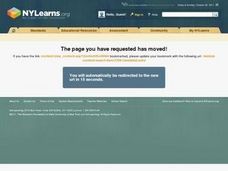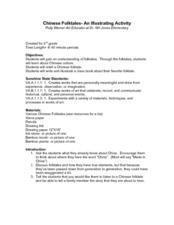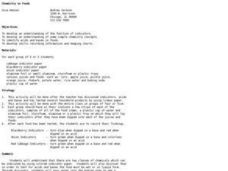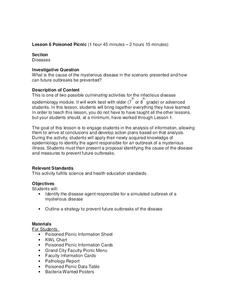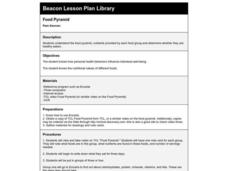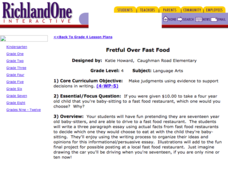Curated OER
Drinks and Snacks in French
Students in a French II class identify food items that can be ordered in a cafe or restaurant. Students spend time reviewing new vocabulary terms then create a cafeteria menu for their school.
Purdue University
Healthy Body Image: A Lesson Plan for Middle School Students
This is a very valuable lesson for middle schoolers on the importance of maintaining a healthy body image through diet, exercise, and positive mentality. The resource includes four lesson plans. The first two plans outline the physical...
Curated OER
St. Patrick's Day Snack
First graders design a green snack menu from all four food groups for St. Patrick's Day.
TV411
Whip up a Storm of Writing Ideas
Need a key to unlock writer's block? Introduce your writers to four easy steps that will release them from their mental prison. The brainstorming worksheet, designed to set free their imaginations, even has an answer key.
Curated OER
What Foods Contain Products from the Ocean
Fifth graders learn about foods from the ocean. In this ocean products activity, 5th graders brainstorm what foods come from the ocean, fill in a Venn Diagram comparing alginates, carrageenans and beta carotenes. Students make a list...
Curated OER
Nutrients for Plants and People: Food Pyramid Garden
In this garden worksheet, students plant different types of food from the food pyramid into a garden and write a journal about all of the food. Students plant 4 levels of food from the food pyramid.
Curated OER
Identifying Food Nutrients
Learners pretend they are a food-quality tester. They develop a kit to test food for sugars, starches, proteins and lipids. They answer questions to complete the lesson plan.
Curated OER
Sugar-Coating the Facts
Students explore the food industry's influence on American Student nutritional habits and analyze the nutrition charts found on food packaging. They design their own warning labels for foods targeted at Students.
Curated OER
Owl Pellets
Sixth graders investigate the role of owls in their ecosystem. In this food chain lesson, 6th graders illustrate an owl food chain, dissect an owl pellet, and analyze data. Students discuss what would happen to owls if there were an...
Science Matters
Oh Heron
Two teams—the environmentalists and herons—play four rounds of the game, Oh Heron. Using hand symbols to represent food, shelter, and water, players locate their match to produce more herons while those unmatched decompose.
Curated OER
Chinese Folktales: An Illustrating Activity
In need of a really good lesson that incorporates literature, art, and cultural themes? After hearing a traditional Chinese folktale and discussing cultural themes and symbolism, learners create original illustrations for the story. This...
Curated OER
Chemistry in Foods
Students investigate foods that are indicators, and acids and bases. In this food chemistry lesson plan, students test household products with litmus paper and with food indicators. They use blackberry, onion and red cabbage indicators...
Curated OER
Foods II Introductory Review Practical Test
Students have a lab experience preparing a recipe demonstrating the techniques learned from Foods I. They identify and explain the appropriate use and care of basic kitchen equipment. They apply the skills and techniques of proper...
Centers for Disease Control and Prevention
Poisoned Picnic
A group of teachers attended a picnic; ten became sick and another four died. Young scholars must solve the mystery of what happened. They research the river, waste water treatment plant, each food that was served, and environmental...
Curated OER
Food Pyramid
Second graders explain the food pyramid, nutrients provided by each food group,and determine whether they are healthy eaters. They note what foods are in this group, what nutrients are found in these foods, and number of servings needed.
Curated OER
Fretful Over Fast Food
Fifth graders research fast food options and write an essay on the topic. In this fast food lesson, 5th graders pretend they are a babysitter and research fast food restaurant options to eat at while they are baby-sitting. Students write...
Illinois Department of Natural Resources
Section One: What is Biodiversity?
Four intriguing and scientific activities invite learners to explore the natural resources of their town. The activities cover concepts such as genetic traits, organizing species in a taxonomy, the differences between different species...
Federal Trade Commission
Ad Creation
How would someone market a new cereal to space aliens? Using the third lesson from a four-part Admongo series on advertising, pupils learn about persuasive techniques companies use to convince consumers to purchase their products. As a...
National Wildlife Federation
What's Your Habitat?
How are third graders like rabbits? They both live in habitats and require food, water, and shelter to survive! An educational science lesson encourages your learners to think about their own habitats and survival needs, before comparing...
Federal Trade Commission
Ad Targeting and Techniques
What techniques do advertisers use to reach a target audience? Pupils discover the answer with the second of four Admongo lesson plans. Scholars learn about the most common strategies advertisers use to convince people to buy something....
Chicago Botanic Garden
The Carbon Cycle
There is 30 percent more carbon in the atmosphere today than there was 150 years ago. The first lesson in the four-part series teaches classes about the carbon cycle. Over two to three days, classes make a model of the cycle, add missing...
NOAA
Through Robot Eyes
How do robots assist ocean explorers in collecting data and images? The final installment in a five-part series has science scholars examine underwater images collected by robots and identify the organisms shown. Groups then calculate...
American Statistical Association
Step into Statastics
Class members study the size of classmates' feet and perform a statistical analysis of their data. They solve for central tendencies, quartiles, and spread for the entire group as well as subgroups. They then write a conclusion based on...
EduGAINs
Consumerism, Me and the Natural Environment— Canadian and World Studies
Just as no man is an island, no country is totally independent of other countries. To understand the impact of individual consumer decisions on the global natural environment, class groups consider how the stuff they purchase connects to...


